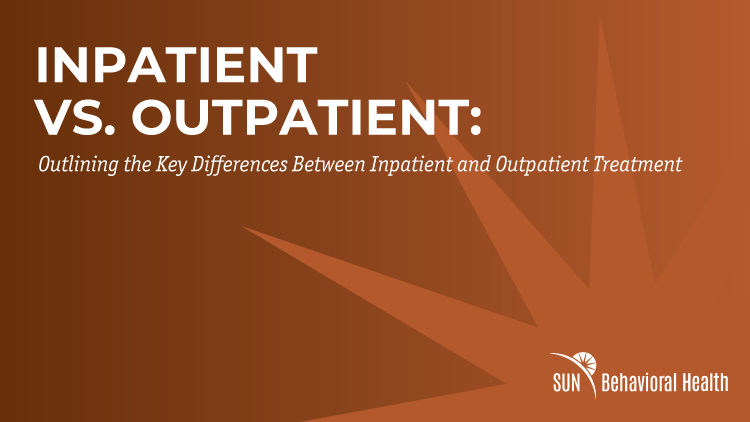Services

Making the decision to take control of your life, health, and future by seeking treatment for a mental health or substance use disorder can be the most difficult part of your journey toward successful recovery.
There are many different treatment options to consider, and the differences between them can be confusing. Most programs for treating mental health and/or substance use disorders use a wide variety of treatment methods to help you gain the skills you need to cope with the difficulties of life in a healthy, sustainable way.
Some elements of treatment programs include various different therapy methods, group and individual counseling, detox, and more. Every program for the treatment of mental health or substance use disorders falls into one of two categories: inpatient or outpatient.
So what are the differences between these two categories of care?
On the most fundamental level, the biggest difference between inpatient and outpatient treatment programs is whether the person seeking treatment stays overnight in the facility or goes home.
In an inpatient program, the person stays at the facility each night, receiving treatment full time without returning home or leaving the facility.
The goal of an outpatient treatment program is to provide the very same treatment options, but rather than stay overnight at the treatment facility, the person is free to return home after programming is done for the day.
SUN Behavioral Delaware is proud to announce we now offer evening outpatient treatment as well as daytime outpatient care. This move comes as the latest in our efforts to cater to members of the Delaware community.
Our Outpatient Evening Program is meant for people who could benefit from treatment for mental health or substance use disorders but also have personal or professional duties to attend to during the day.
It’s important to understand that the question of inpatient vs. outpatient care isn’t as simple as saying one is more effective than the other. The question comes down to figuring out which approach to treatment is best for each particular person and their unique situation.
In order to figure that out, it’s important to examine and understand each type of treatment and its individual benefits.
Outpatient treatment for mental health and substance use disorders involves daily programming, such as counseling, and both individual and group therapy sessions. All of this takes place within a licensed treatment facility.
People who choose to enter outpatient treatment at SUN Behavioral Delaware can attend therapeutic and educational programming either in the day or the evening. This allows for the person to receive a high level of compassionate care and treatment while still fulfilling professional and personal duties at home.
Outpatient programs are also typically less costly than inpatient programs but also provide a less intensive level of care.
There are numerous benefits of outpatient treatment programs that can make them the best choice for many people. Some of these benefits include:
Outpatient treatment may not be the best option for a person seeking help with mental health or addiction issues if:
Inpatient programs are often referred to as residential or live-in programs because the person receiving treatment also lives at the treatment facility throughout the program. This level of care can be very effective for people experiencing severe, underlying, and co-occurring mental health conditions. It can also be very effective for anyone who is facing severe substance use disorder.
Receiving treatment while living at the facility can help the person by removing them from a potentially harmful living environment and allowing them to start healing without the influences, stressors, or temptations of daily life that can be triggering.
Inpatient care for mental health and/or substance use disorders has many benefits that may make it the best fit for certain people. Some of the benefits include:
An important thing to consider when determining if inpatient treatment is the best option for you and your unique situation is that it will always require a larger commitment than outpatient programs. For a person considering this approach to treatment, it’s also important to keep the following points in mind:
Making the decision to seek help for a mental health or substance use disorder can be a lonely, confusing, and emotional experience, but you are not alone. If you or someone you love is struggling, SUN Behavioral Health Delaware is here to help. Please call us today at (302) 207-6152 to get help for you, your family, or your loved one.
In an inpatient treatment program, the person receives support and treatment while staying overnight and living at the facility for the duration of the program. In outpatient programs, the person attends treatment during the day or evening but sleeps at home.
Outpatient is not necessarily better than inpatient for the treatment of mental health or substance use issues. Licensed treatment facilities will typically work with you to determine which approach to treatment is appropriate for your unique situation.
Emergency room visits are typically considered outpatient, but if the person’s condition is severe enough to require hospitalization, it turns into an inpatient situation.